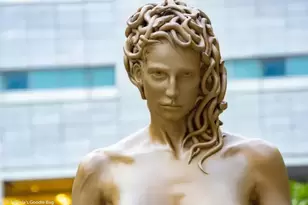Medusa as a feminist Icon and some fun short stories featuring Medusa
| Medusa with the Head of Perseus by Luciano Barbati Image courtesy of JeseniasGoodieBag | What if Medusa returned and used her rageful gaze to fill the halls of power with statues . . . Two excellent poems prompted me to revisit my 12/22/2021 post on Medusa: Gerri Lynn’s “Medusa Ups Her Game” in Pyre Magazine, and “Medusa Gets a Haircut” by Theodora Goss in Uncanny Magazine. I’ve long enjoyed fictional retakes on Medusa's story, such as Michael Cadnum’s “Medusa” in the YA Firebirds anthology and an exceptional story about Medusa inside a statue of the Virgin Mary hiding from Perseus, whose title and author I cannot locate. Argh! Please, please contact me if you know! |
My fascination with Medusa began with an article by Emily Erwin Culpepper, “Ancient Gorgons: A Face for Contemporary Women’s Rage,” in Issue 3, Winter/Spring, 1986 edition of Woman of Power, a sadly defunct magazine of feminism, spirituality, and politics.
Culpepper said: “The Gorgon has much vital, literally life-saving information to teach women about anger, rage, power, and the release of the determined aggressiveness sometimes needed for survival.”
More recently, Medusa’s likeness has been retooled in popular media ranging from Rihanna’s sexually explosive pose for GQ magazine to the empowering sculpture by Luciano Garbati above, more aligned with the #MeToo movement and women's struggles for empowerment within patriarchy.
For a more in-depth discussion of Medusa as a feminist icon, check out this Boshemia blog.
I’ll close with this excerpt from an invocation to Medusa:
“I am Medusa, the Gorgon, Lady of Snakes . . . Heed me, for I challenge you to embrace your own power.”
Culpepper said: “The Gorgon has much vital, literally life-saving information to teach women about anger, rage, power, and the release of the determined aggressiveness sometimes needed for survival.”
More recently, Medusa’s likeness has been retooled in popular media ranging from Rihanna’s sexually explosive pose for GQ magazine to the empowering sculpture by Luciano Garbati above, more aligned with the #MeToo movement and women's struggles for empowerment within patriarchy.
For a more in-depth discussion of Medusa as a feminist icon, check out this Boshemia blog.
I’ll close with this excerpt from an invocation to Medusa:
“I am Medusa, the Gorgon, Lady of Snakes . . . Heed me, for I challenge you to embrace your own power.”


 RSS Feed
RSS Feed